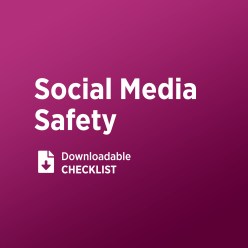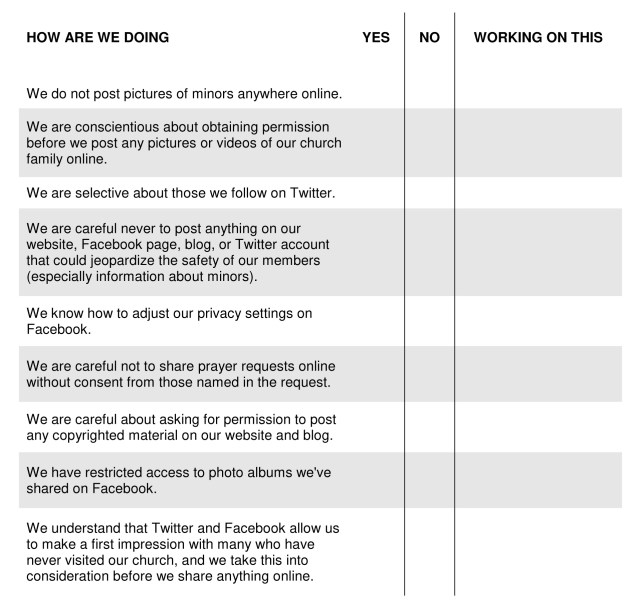Churches continue to find new ways to use social media for ministry. This strategy can be effective—for building community, strengthening communication among members, and reaching out to unchurched people in the community. But churches that dive headfirst into the social media pool without fully understanding the risks could find themselves in over their head. Use this assessment to gauge your church’s understanding of the risks involved with social media.
Download a PDF version of this checklist.
Facebook and Twitter are among the most frequented sites online. Which means these sites can provide considerable benefits for churches. These social networking services do come with certain risks—for individuals, businesses, and churches. Understanding how these websites work—and how they should be used—is the key to avoiding the pitfalls of social media.
Facebook is the most popular type of social media. And it also harbors the most potential risks for churches. Here are some tips for avoiding risks on Facebook:
Don’t provide too much information. When posting comments, writing a status update, or deciding what information to include on the church Facebook page, remember that anyone could be reading it. Facebook might seem like a place to interact with friends (and it is), but Facebook also attracts deviants, predators, and those hoping to steal the identities of others. Some information is necessary, but revealing too much is dangerous.
Delete anything inappropriate. If your church Facebook page is accessible to all, then anyone can post a comment on the “wall.” At least one person should be checking this daily (email notifications can be set up to alert users about any new posts), and anything inappropriate should be deleted immediately. Whether it’s an inappropriate comment, a link to a questionable site, or a harmless comment posted by someone with a racy profile picture—these things, if not removed, might reflect negatively on your church, especially for those who could be visiting your church’s Facebook page without any prior knowledge about who you are and what you value as a congregation. As far as that visitor knows, the person posting inappropriate content could be a church member—and the fact that it hasn’t been deleted will suggest that the church leaders didn’t have a problem with it.
Understand the privacy settings. Facebook’s default privacy settings are not private. As a church, there is some information you will want to make available to all (who you are, what you believe in, where you are located, etc.), and other information you will want to keep private. Customize the privacy settings to get the right balance.
Protect your photos. Sharing photos is one of the features that attracts many users to Facebook. But as a church, you should be extremely careful what pictures you post—and who you allow to view them. If minors are pictured, do not include their names in the captions. And do not make these photos available to everyone. Doing so could open up your church family to potential predators.
Making first impressions. Facebook is fun, but churches should remember that their Facebook for those in the community (or anywhere in the world) who have never been to the church. Facebook provides a venue for friends to stay in touch, for new acquaintances to become friends, and for friends and family members to interact in amusing ways. Having fun is not a bad thing—but if a church is taking the time to operate a Facebook page, then they should be doing it with a clear purpose in mind.
See Using Social Media Safely for more information.






